- Home
- Alex Hughes
Clean: A Mindspace Investigations Novel
Clean: A Mindspace Investigations Novel Read online
Praise for
Clean
“Hughes’s world is an interesting mix of old and new, a world of flying cars and noirish, steamy streets that are a fun blend of Chinatown and Blade Runner. The cat-and-mouse murder investigation between those who can both kill and hunt with the power of the mind is fascinating…. Hughes knows how to unfold a mystery to be sure she never loses sight of her characters’ humanity. She understands the nature of addiction, and has a keen understanding of the human condition, with all of its desires, fears, and frailties. I look forward to jumping back into Mindspace again.”
—James Knapp, author of
State of Decay
“A solid, tightly written story.”
—Publishers Weekly
“I am addicted to this world, this character, and this writer. Alex Hughes spins stories like wizards spin spells…a stellar debut!”
—James R. Tuck, author of the
Deacon Chalk series
CLEAN
A MINDSPACE INVESTIGATIONS NOVEL
Alex Hughes
A ROC BOOK
ROC
Published by New American Library, a division of
Penguin Group (USA) Inc., 375 Hudson Street,
New York, New York 10014, USA
Penguin Group (Canada), 90 Eglinton Avenue East, Suite 700, Toronto,
Ontario M4P 2Y3, Canada (a division of Pearson Penguin Canada Inc.)
Penguin Books Ltd., 80 Strand, London WC2R 0RL, England
Penguin Ireland, 25 St. Stephen’s Green, Dublin 2,
Ireland (a division of Penguin Books Ltd.)
Penguin Group (Australia), 250 Camberwell Road, Camberwell, Victoria 3124,
Australia (a division of Pearson Australia Group Pty. Ltd.)
Penguin Books India Pvt. Ltd., 11 Community Centre, Panchsheel Park,
New Delhi - 110 017, India
Penguin Group (NZ), 67 Apollo Drive, Rosedale, Auckland 0632,
New Zealand (a division of Pearson New Zealand Ltd.)
Penguin Books (South Africa) (Pty.) Ltd., 24 Sturdee Avenue,
Rosebank, Johannesburg 2196, South Africa
Penguin Books Ltd., Registered Offices:
80 Strand, London WC2R 0RL, England
First published by Roc, an imprint of New American Library,
a division of Penguin Group (USA) Inc.
First Printing, September 2012
10 9 8 7 6 5 4 3 2 1
ISBN: 978-1-101-59639-5
Copyright © Alexandra Hughes, 2012
All rights reserved. No part of this book may be reproduced, scanned, or distributed in any printed or electronic form without permission. Please do not participate in or encourage piracy of copyrighted materials in violation of the author’s rights. Purchase only authorized editions.
REGISTERED TRADEMARK—MARCA REGISTRADA
Printed in the United States of America
PUBLISHER’S NOTE
This is a work of fiction. Names, characters, places, and incidents either are the product of the author’s imagination or are used fictitiously, and any resemblance to actual persons, living or dead, business establishments, events, or locales is entirely coincidental.
The publisher does not have any control over and does not assume any responsibility for author or third-party Web sites or their content.
If you purchased this book without a cover you should be aware that this book is stolen property. It was reported as “unsold and destroyed” to the publisher and neither the author nor the publisher has received any payment for this “stripped book.”
ALWAYS LEARNING
PEARSON
To Paula Gillispie and Julie Gray, because I promised.
To Dan Marshall, because he deserves it.
Table of Contents
Chapter 1
Chapter 2
Chapter 3
Chapter 4
Chapter 5
Chapter 6
Chapter 7
Chapter 8
Chapter 9
Chapter 10
Chapter 11
Chapter 12
Chapter 13
Chapter 14
Chapter 15
Chapter 16
Chapter 17
Chapter 18
Chapter 19
Chapter 20
Chapter 21
Chapter 22
Chapter 23
Chapter 24
Chapter 25
Chapter 26
Chapter 27
Chapter 28
Chapter 29
Chapter 30
About the Author
CHAPTER 1
My first interview of the night was Esperanza Mensalez-Már, a thirty-something woman dressed in a pink-pressed suit I suspected cost more than my last paycheck. Not that I’d seen the paycheck, but that was the kind of impression she gave off, like she had too much money to cope. She was here as a suspect in the death of her husband.
A uniformed officer escorted me, today’s babysitter to make sure I didn’t break any laws while interrogating. He took a menacing position at the back of the room and glared at the woman like she was his worst enemy—exactly what I wanted.
I entered, carrying my props: an old-fashioned ream of paper and two sharpened pencils. From the tape they’d given me, I’d pegged Esperanza as a control freak. So I threw the paper down crooked, spilling it everywhere, adding the pencils so they rolled along the table, then slouched back in the chair. I grabbed one of the pencils just before it hit the floor and started tapping it on the table. Tap, tappity-tap. Tappity-tap, tap, tap. Just for fun, I altered the pattern every now and then to keep it grating on her nerves.
I stared at Esperanza for a long time while the pencil tapped against the table. Since Lieutenant Paulsen had exiled me to the interview rooms again, I’d be here three hours or more with nowhere else to go; I thought about that hard, knowing some of it would leak into my face.
After ten minutes, her hand shot out and flattened mine against the table, stopping the pencil. “Stop,” she said. “Just stop.”
Once her hand touched mine, I had what I needed. “I’m required by law in this situation to tell you I’m a Level Eight telepath.”
Her hand shot back immediately. She wiped it against her skirt by reflex, as if she’d touched something slimy. The cold mask she’d worn had transformed into a look of abject horror. “You—”
“I’m also required by law to tell you that skin-to-skin physical contact increases my ability to read your mind. Under certain conditions, it can be hazardous to your health and mental well-being, so for most people it’s considered wise to avoid all physical contact with telepaths.” I quoted the standard write-up the Guild gave the public. In reality, touch was only dangerous when the telepath wasn’t expecting it, and I’d figured her to do just what she had. So I’d blocked as a precaution. Any normal could have told you all she was thinking about was the tapping anyway.
She started to say something, but I cut her off. “I’m very impressed, Esperanza.”
“It’s Mrs. Mensalez-Már,” she said evenly, steel in her voice. I’d hit a nerve.
I slouched back in the chair and started tapping the pencil again, staring at her patiently. I’d noticed in the previous interviewer’s tape that the more he attacked her on a point of her story, the more she’d get cold and professional. So I’d back up, let her own fears work on her a bit. See what would happen.
She couldn’t take the silence long. “You can’t possibly—”
“I can feel how much you hated him,” I stated calmly, in the tone of voice you’d use to start a long story. “But the hyphen on your name was wort
h, what, four hundred thousand ROCs?”
“Eighteen million,” Esperanza corrected, her eyes narrowing.
“The house alone was worth, what? Maybe two?”
“Three point eight.” She preened.
“It was a masterful plan. You must have set it up two years in advance. More maybe.” My tone was admiring, flattering.
“Four,” she sniffed. “The idiot never even saw it coming.”
I got in three more questions—with answers—before her brain caught up.
Suddenly, her eyes widened as she realized what she’d said, and the ugliness in her soul came out like a plague. “I want a lawyer,” Mrs. Mensalez-Már said. “Now.”
I pulled out a pack of blue cigarettes and lit up, breathing in the nicotine a little desperately. I was on the smoking porch, an old slab of cracked concrete with a little awning behind the main bulk of DeKalb County Police Department Headquarters, where the shadow of the four-story building cooled down the air a few degrees at this time of day. In August in Atlanta, when the heat flattened you like the arms of a heavyweight boxer, you’d take whatever relief you could get.
As I stood, sweat already beginning to gather in a pool at the top of my shoulder blades, I tried to retrieve my sanity from wherever I’d left it last. I wanted Satin, a drug, a habit, a poison—the fantasy I’d denied myself for three long years. It would have been six if I hadn’t fallen off the wagon twice. If it had been six, would this be easier? As my hands shook with a need for something I couldn’t have, I thought, It has to get easier. I couldn’t have that rush, that stark perfection, not today. Not today.
My hands shook and my brain cramped while I took another desperate drag of nicotine, looking out over the grimy courtyard and the old steel building behind it, watching the drizzly rain migrate more pollution into the soil. I struggled to focus, to remember the cops behind me. There was a reason I worked for them. On my better days, I knew they’d keep me on the wagon or die trying. Never mind the hostility. Never mind that I had to keep up a steady supply of rabbits to pull out of the hat just to earn my place.
When the Telepaths’ Guild kicked me out, I had all the tests, all the ratings, all the gold stars a man could get. Level Eight, seventy-eight-P, I was a stronger telepath than most of the elite, and could predict the future correctly better than three times out of four. Still could, at least when the precog felt like working, but it hadn’t in months. Lately I was starting to run out of rabbits, not good for my relationship with the cops. Speaking of…
Behind me, the heavy door creaked open, and I greeted the mind behind me. “Cherabino.”
Detective Isabella Cherabino was a thirty-something brunette, stacked, pretty, a workaholic, and perpetually in a bad mood. We would have been partners if we had been equals, but we weren’t. I was her pet cobra, maybe, or the monkey with the cymbals that followed her around. If a monkey could solve crimes in Mindspace, or pull rabbits out of hats and interview suspects, if the monkey was a dumb guy who annoyed her at regular intervals, that’s maybe what I was to her. Maybe. On a good day.
On the porch, her nose wrinkled at the smell of the cigarettes.
“I don’t understand why you like it out here. It’s miserable.”
I shrugged. “It’s scenic.” It was also deserted, at least ten feet from anybody’s thoughts in Mindspace. Stressed-out cops, suspects freaking out about interrogations, hostile criminals…Let’s just say the mental surroundings reeked. Even the heat was a break.
“I heard about the confession. Do too many of those and they won’t ever let you out of the interview room again.” She looked at me critically. “If you’re feeling twitchy again, I can wait while you call Swartz.”
I snuffed out the cigarette under my shoe, ignoring the comment. I didn’t want to talk about my craving to my sponsor right now. I could feel Cherabino’s tension and a hint of purpose—probably a new case—but she got testy when I jumped ahead. “What can I do for you?” I asked her.
“You’ve heard about the murders?”
“The serial thing, right?”
Her jaw tightened. “Captain says we don’t say serial. Try to keep it quiet. Hope the papers don’t put it together.” She was obviously not a fan of this plan, but Cherabino could toe the line when she had to.
She was thinking loudly, and I didn’t bother shutting her out. Six bodies? Really? “Six bodies in two months, it’s a serial. Doesn’t matter what they call it.”
“If they can link them,” she returned. “We aren’t publicizing cause of death, and the victims aren’t related any way I can see. Might take them some time, and in the meantime we have a shot at solving it.” Her “we” meant her, the team, and me…specifically.
“Why me?” I asked.
She frowned at me. Oops, jumping ahead again—have to watch that.
“We’re stuck. As I suppose you already know. I was hoping you’d do the Mindspace thing and get me a lead. Or two. Two would be nice.”
I thought about another cigarette and gave it up as a lost cause. She was going to ask me to leave now. I didn’t think I had any other priority interviews scheduled this afternoon. I rubbed my jaw, thinking, and along the way realized I hadn’t shaved…since yesterday morning, felt like. Maybe a little longer. Have to take care of that soon.
“You listening?” she spat.
I blinked. “Yeah, just let me get my stuff and check in with Paulsen.”
It took her a minute to realize she hadn’t asked me to leave yet and that I’d read it straight off her mind. She stared and seriously considered slapping the hell out of me. “Stay out of my head, damn it! I’ve told you before.”
I stepped back, and she stalked off. Great, now I’d made Cherabino mad at me, and I knew better.
I sighed, wishing for another cigarette, and fought down guilt. At least now I wasn’t craving my poison so bad. Distraction was a great trick, one of the first ones they teach you in the program. If I was going to see a crime scene, there would be plenty more distraction—even if it was stuff I’d rather not see.
I patted down my pockets, made sure I had everything, the lighter and pack where they were supposed to be, and rolled my sleeves back down. I didn’t advertise the scars on my arms, not for any reason, and if long sleeves in August were the price I had to pay, so be it.
I held on to the car door with a white-knuckled grip, and took deep breaths. Cherabino had hit the flyer anti-grav in the middle of the groundstreet—highly illegal—risen up two stories within the span of a second with no warning, and was now flipping off the BMW who’d had the temerity to get in her way. She merged into the correct sky lane, narrowly missing the floating marker.
Below, a police-sponsored sign on the old Decatur train station’s roof reminded commuters: fly safe and in your lane. Not that there was irony or anything.
Cherabino turned on the siren for no good reason and forced herself into the air traffic over East College Avenue. She got too close to the air stream from the bullet train on the railroad tracks below and the flyer dipped alarmingly—I swallowed bile—but she recovered, muttering obscenities.
I thought about reminding her about the new fuel/flight restrictions for the department, but her mental cursing got louder. I took a breath and blocked her out, giving her the privacy she’d demanded. It was a lot harder than it should have been.
Her driving regained a measure of sanity as she leveled off and set the altimeter to auto. I looked down as the shadow of the police cruiser fell on the dirty redbrick buildings and the stream of groundcars below. It was lunchtime congestion, the yuppies out for quick carnivorous lunches fighting with the second-shift blue collars already late for work in the factories to the east.
I decided to risk talking. “You said there were six victims?”
“That’s right.” She adjusted a mirror, gave a suspicious look to the driver minding his own business behind her, then glanced back at me. “In order: thirty-something male Hispanic, an old white woman, a young b
lack one, Indian scientist forty-something, and the two Asian teenagers from last week. I can’t see they have anything in common other than the way they were dumped—and trust me, we’ve looked.”
“You look worried,” I said.
She sighed. “He’s escalating, to have another this quickly. And I need a break in the case. Badly.”
“You don’t know it’s a he,” I said. “Do you?”
“You kidding? It’s always a man with a group like this. Women take murder a lot more personally.”
She had a point, but I replied, “Nobody says it can’t be a group.”
“Don’t be a smartass,” Cherabino said without malice. Garden roofs and skyboard advertisements dotted the tops of the otherwise-grimy ancient buildings below as we crossed west into the East Atlanta borough. “God knows we need a break in this case, yesterday. Captain got a phone call from the mayor Tuesday. He wants this solved, before the papers start splashing ‘serial’ across the front page.”
“Something like that could be bad for business. Not like a normal murder or anything.”
“Yeah.” She blew out a long line of air. “These are anything but normal.”
I could feel a line of worry coming from her, and I blocked harder. A flash of an upcoming date next week came through—I frowned. What were we talking about again? Oh yeah. “What’s so different about these?” I asked. “Other than the hodgepodge of victims.”
Her lips pursed. “Everything. There’s no obvious cause of death. No weapon marks, no fresh wounds, tox screens clean. If the bodies hadn’t been dumped, we probably would have assumed stroke, maybe even for the teenagers. There’s just no reason why they should—”
I suppressed a yell as Cherabino grounded too quickly on Hosea Williams Street—not dangerous, not illegal, but scary as hell without a warning.
She glanced back over at me disapprovingly as if her driving was my fault. “The fact I can’t connect the victims is starting to piss me off. No serial I’ve ever heard about picks random victims off the street this different—they always have a type. They work the type. Every briefing in the world says they work a type.”

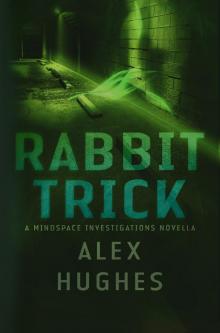 Rabbit Trick: A Mindspace Investigations Short Story
Rabbit Trick: A Mindspace Investigations Short Story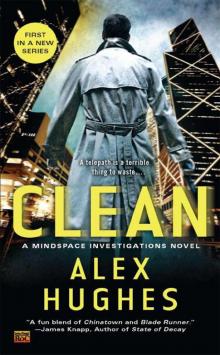 Clean: A Mindspace Investigations Novel
Clean: A Mindspace Investigations Novel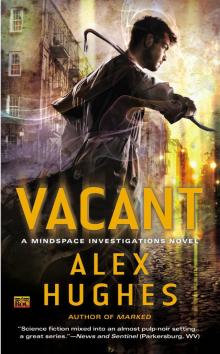 Vacant
Vacant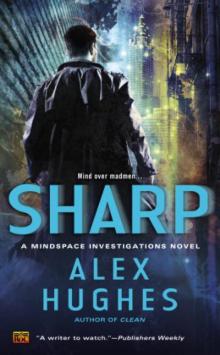 Sharp: A Mindspace Investigations Novel
Sharp: A Mindspace Investigations Novel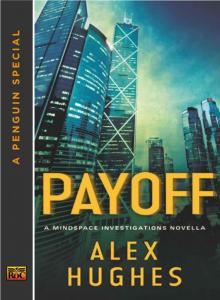 Payoff
Payoff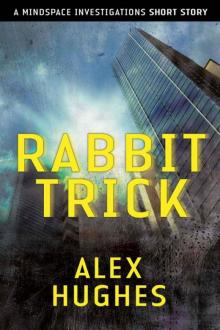 Rabbit Trick: A Mindspace Investigations Novella
Rabbit Trick: A Mindspace Investigations Novella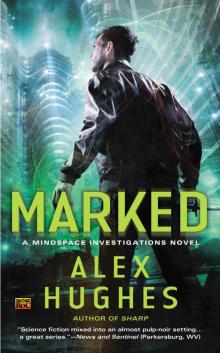 Marked
Marked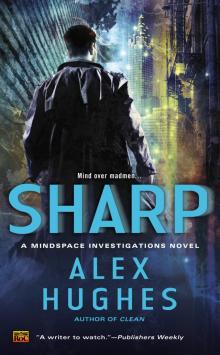 Sharp
Sharp